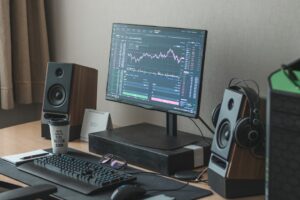Forex Trade Investment for Beginners: A Comprehensive Guide
If you’ve ever wondered about investing in the forex market but didn’t know where to start, you’re not alone. Forex trading can be a lucrative venture, but it also requires knowledge, skill, and careful planning. In this comprehensive guide, we will walk you through the basics of forex trade investment, providing you with the necessary foundation to get started.
What is Forex?
Forex, short for foreign exchange, is the decentralized global market where all the world’s currencies are traded. It is the largest and most liquid financial market, with trillions of dollars traded daily. Unlike traditional stock markets, which open and close at specific times, the forex market operates 24 hours a day, five days a week.
Understanding Currency Pairs
In forex trading, currencies are always traded in pairs. The first currency in the pair is called the base currency, while the second currency is the quote or counter currency. For example, in the EUR/USD currency pair, the Euro is the base currency, and the US Dollar is the quote currency. The exchange rate between the two currencies represents how much of the quote currency is needed to buy one unit of the base currency.
Forex Brokers and Trading Accounts
To participate in forex trading, you will need to open an account with a forex broker. There are numerous brokers available, so it’s important to choose one that suits your needs. Consider factors such as regulation, trading platforms, customer support, and fees. When opening an account, you will be required to provide identification documents as part of the broker’s Know Your Customer (KYC) process.
Demo Trading and Education
Before risking real money, it’s highly recommended for beginners to practice trading through demo accounts. Most forex brokers offer demo accounts that simulate real trading conditions. This allows you to familiarize yourself with the trading platform, test different strategies, and gain confidence in your trading abilities without any financial risk. Additionally, take advantage of the educational resources provided by brokers, such as webinars, tutorials, and trading guides.
Fundamental and Technical Analysis
To make informed trading decisions, forex traders use a combination of fundamental and technical analysis. Fundamental analysis involves studying economic indicators, geopolitical events, and central bank policies that can impact currency values. Technical analysis, on the other hand, focuses on analyzing price charts and using various indicators to identify trends, support and resistance levels, and entry and exit points.
Risk Management
Managing risk is crucial in forex trading. It involves setting stop-loss orders to limit potential losses and take-profit orders to secure profits. It’s important to define your risk tolerance and set a risk-reward ratio for each trade. Additionally, avoid risking a significant portion of your trading capital on a single trade. Diversification is key to spreading risk and protecting your investment.
Choosing a Trading Strategy
There are various trading strategies to choose from, each with its own advantages and disadvantages. Some common strategies include day trading, swing trading, and trend following. It’s essential to find a strategy that aligns with your trading style, personality, and time availability. Remember, there is no one-size-fits-all approach, and what works for one trader may not work for another.
Psychology and Emotions
Emotional control is essential in forex trading. Fear and greed can cloud judgment and lead to poor decision-making. It’s crucial to remain disciplined and stick to your trading plan. Avoid making impulsive trades based on emotions or trying to recoup losses quickly. Forex trading requires patience, perseverance, and a long-term approach.
Conclusion
Forex trade investment can be an exciting and potentially profitable venture for beginners. However, it’s important to approach it with caution and acquire the necessary knowledge and skills. Start by understanding the basics of forex trading, opening a demo account, and educating yourself through available resources. Remember to practice risk management, choose a suitable trading strategy, and maintain emotional control. With time and experience, you can develop the skills needed to navigate the forex market successfully.





